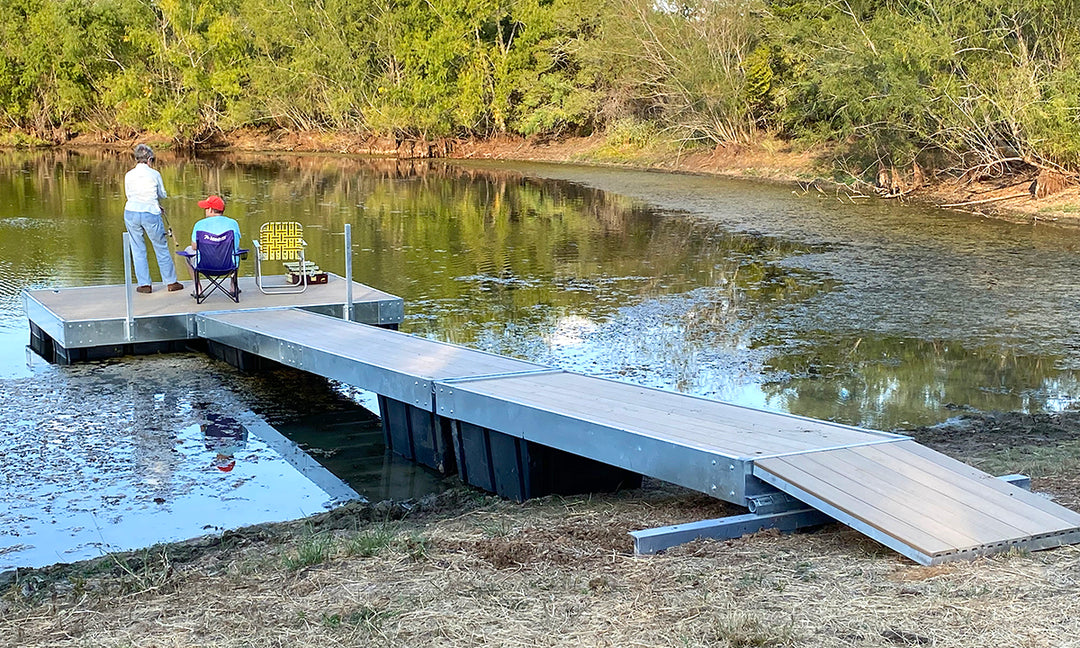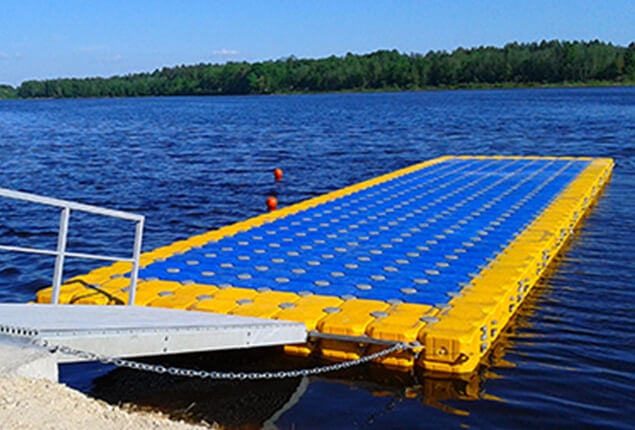Cutting-edge Floating Docks: The Future of Beachfront Gain Access To and Leisure
Floating Docks: The Ideal Option for Versatile Water Access
Floating docks existing a compelling remedy for a range of water accessibility requires, providing adaptability that goes beyond standard mooring choices. Their capability to adapt to fluctuating water degrees while making sure stability and security makes them specifically helpful for both commercial and entertainment applications. The modular nature of floating docks facilitates customization, catering to particular requirements. The nuances of setup and maintenance, together with the variety of applications, call for a closer assessment to completely appreciate their prospective advantages and effects for river gain access to methods.
Benefits of Floating Docks
Floating docks offer various advantages that boost water accessibility for different applications. Their ability to fluctuate with changing water degrees makes them specifically useful in environments with varying tides or seasonal variants. This flexibility makes sure that vessels can easily tie without problem for the water's deepness, supplying a reputable platform for entertainment, business, and industrial usages.
Additionally, floating docks are commonly constructed from long lasting products that stand up to corrosion, making them suitable for long-term use in aquatic settings. Their setup is normally less invasive than typical set docks, reducing the environmental effect and promoting quicker deployment (floating dock company). This adaptability permits easier relocation or reconfiguration according to individual requirements or ecological modifications
Security is one more crucial benefit; floating docks can provide stable accessibility for people boarding or getting off from watercrafts and minimize the danger of accidents associated with unstable surfaces. In addition, they can be made to suit a selection of devices, such as fenders and cleats, boosting functionality. On the whole, floating docks stand for a reliable remedy for enhancing water gain access to across varied industries while promoting safety and environmental sustainability.

Sorts Of Floating Docks
Different types of floating docks satisfy different requirements and environments, each made with certain functions to maximize performance. The most common kinds consist of modular docks, which are composed of interlacing sections that permit very easy customization and growth. These docks are perfect for entertainment use, as they can be tailored to fit different watercraft sizes and water conditions.
One more preferred option is the stationary floating dock, which remains secured in place yet drifts with changing water degrees. floating dock builder. This type is especially suited for locations with very little tidal variations, providing stable gain access to for fishing or swimming. Furthermore, there are drive-on docks, which include a sloped layout that permits watercrafts to conveniently drive on and off, making them suitable for personal watercraft and smaller vessels
For commercial applications, heavy-duty floating docks are available, constructed from reinforced materials to endure considerable tons and extreme aquatic settings. Last but not least, environmentally friendly floating docks use sustainable materials and designs to minimize environmental impact, commonly including attributes like plant life to sustain regional wildlife. Recognizing the different sorts of floating docks makes sure that individuals can choose one of the most proper option for their certain demands.
Setup Process Review
An effective installment of floating docks needs careful preparation and attention to information to make certain optimum performance and safety. The initial action includes evaluating the site problems, including water depth, existing, and prospective challenges. This assessment educates the choice of the suitable dock materials and design customized to the details setting.
Next, obtaining essential authorizations is crucial, as several territories have guidelines relating to construction on water bodies. As soon as authorizations are safeguarded, the setup can continue. Begin by preparing the structure, which get redirected here may include anchoring systems or pilings customized to the dock kind and local conditions.
Adhering to the foundation configuration, construct the dock sections according to maker requirements. Ensure that all elements are firmly fastened and lined up to hold up against ecological tensions. Setting the dock in the marked location, ensuring it is level and steady.

Upkeep Tips and Ideal Practices
After the installment procedure is complete, ongoing upkeep plays a vital function in making certain the longevity and performance of floating docks. Normal inspections should be conducted to recognize any kind of indicators try here of wear and tear, wear, or damage - floating dock builder. Look for any loosened installations, cracks, or separation in the dock areas, as these can jeopardize structural integrity
Cleansing the dock is crucial to eliminate debris, algae, and various other build-up that can influence its appearance and safety and security. Use a gentle pressure wash occasionally to maintain sanitation without triggering damage to the surface area. Additionally, using a protective sealant every couple of years can assist boost longevity and stand up to environmental wear.
Take note of the mooring lines and anchors, guaranteeing they are safe and totally free from deterioration. Replace any kind of degraded elements without delay to prevent threats. Seasonal modifications might likewise be essential; during severe climate condition, strengthening the dock or repositioning can avoid damage.
Applications for Floating Docks
Floating docks serve a wide variety of applications, accommodating both leisure and business needs. In leisure settings, they supply smooth accessibility to waterways for tasks such as boating, angling, and swimming. Their flexible nature allows for installation in varying water levels, making sure secure and stable gain access to no matter of tidal variations.
Readily, floating docks are essential for marinas and waterside organizations. They facilitate the docking of vessels, enabling efficient loading and unloading of goods. Their modular design enables easy expansion or reconfiguration to suit changing organization needs, making them perfect for boat rentals, tour operations, or angling charters.
In addition, floating docks are used in environmental applications such as aquatic research and habitat reconstruction. They can work as systems for clinical researches, monitoring water his comment is here top quality, or performing wild animals studies without troubling delicate ecological communities.
In commercial contexts, floating docks are utilized in building projects, providing access to hard-to-reach locations for equipment and employees. Their convenience, durability, and marginal influence on the setting make them an ideal choice for a large range of applications, improving both functionality and accessibility in numerous water-based atmospheres.
Conclusion
Finally, floating docks stand for an optimum service for diverse water accessibility requires, owing to their adaptability, durability, and modular design. These structures assist in risk-free mooring for different applications while decreasing ecological influence during installment. The reduced upkeep demands further enhance their practicality. Floating docks offer as a useful asset for leisure, industrial, and ecological projects, making sure dependable access to rivers and advertising lasting practices in water atmospheres.
Floating docks present a compelling service for a variety of water access needs, using convenience that goes beyond conventional mooring options.Floating docks deal numerous benefits that enhance water accessibility for various applications. In general, floating docks represent a reliable service for boosting water accessibility across diverse markets while advertising safety and security and ecological sustainability.
Another prominent choice is the fixed floating dock, which stays anchored in area but drifts with transforming water degrees.In final thought, floating docks stand for an optimum option for diverse water access requires, owing to their versatility, longevity, and modular layout.